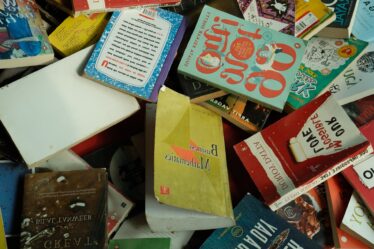
In a world dominated by smartphones, social media, and a constant barrage of information, poetry might seem like a relic of a bygone era. Yet, for me, it has been a steadfast companion through life’s challenges and joys. I remember vividly the first time I encountered poetry—an old, tattered book of sonnets my grandmother left behind. It was as if those pages held a portal to another dimension, one where emotions, ideas, and beauty intertwined in a way that I hadn’t encountered before.
As I grew older and technology became a central part of my life, I began to wonder: does poetry still have a place in the digital age? Or has it been overshadowed by the endless scroll of quick content? To my delight, I discovered that poetry not only endures but thrives, offering a powerful antidote to our increasingly fragmented attention spans. In fact, exploring poetry has enriched my life more profoundly than I ever imagined, and I’m here to share why it might do the same for you. (If you’re juggling academic responsibilities alongside personal growth, I’ve also found solace in resources like this trusted essay writing service, which has eased my workload during especially hectic times.)
My Journey with Poetry
Poetry entered my life unexpectedly. At first, it was an occasional interest—a few lines here and there that resonated deeply. But over time, it became a passion. I would spend hours immersed in the works of Emily Dickinson, Robert Frost, and Langston Hughes, marveling at their ability to capture the essence of human experience in a handful of words.
I vividly recall reading Sylvia Plath’s “Mirror” during a particularly turbulent time in my life. Her words struck a chord, offering not just comfort but a reflection of my own struggles. Poetry became a mirror for my thoughts, a means of understanding my emotions, and a way to connect with something greater than myself.
As technology advanced, I noticed that many people began consuming information differently. The rise of quick, digestible content—tweets, TikTok videos, and Instagram reels—made long-form reading less common. Yet, poetry, with its brevity and depth, seemed uniquely suited to this new landscape. It requires focus and rewards you with meaning that lingers long after you’ve read it.
Why Poetry Matters in the Digital Age
Enhances Focus and Patience
In an era of rapid information consumption, poetry offers a rare opportunity to slow down. When I read a poem, I’m forced to pause and truly engage with the text. The rhythm, the imagery, and the hidden meanings demand my full attention. Unlike scrolling through headlines, reading poetry is an active experience. It trains the mind to focus and savor each word.
I remember encountering Mary Oliver’s “The Summer Day” during a hectic week. Her simple yet profound question, “Tell me, what is it you plan to do with your one wild and precious life?”, stayed with me for days. In a world where distractions abound, poetry’s ability to command focus feels almost revolutionary.
Encourages Emotional Connection
Poetry has an unparalleled ability to express emotions that are often difficult to articulate. Through its metaphors and rhythms, it captures feelings we might not even realize we’re experiencing. For instance, reading Maya Angelou’s “Still I Rise” during a moment of self-doubt was like receiving a personal pep talk from someone who understood exactly what I needed to hear.
By connecting us to universal emotions, poetry bridges the gaps between people and reminds us of our shared humanity. In a digital age where online interactions can feel superficial, this emotional depth is more important than ever.
Fosters Creativity and Critical Thinking
Interpreting poetry is a creative act. Every line invites you to explore multiple meanings, encouraging critical thinking and imagination. I’ve found that reading and writing poetry have sharpened my analytical skills in unexpected ways. Decoding the symbolism in T.S. Eliot’s “The Waste Land”, for instance, felt like solving a beautiful puzzle—one that left me more attuned to nuances in other aspects of life.
How Technology Has Altered Poetry Consumption
The digital age has undoubtedly transformed how we engage with poetry. On the one hand, platforms like Instagram have popularized “Instapoetry,” making the art form more accessible to younger audiences. Poets like Rupi Kaur have found massive followings by sharing short, impactful pieces online. Personally, I’ve discovered countless new poets through social media, some of whom have profoundly influenced my own writing.
On the other hand, this shift comes with challenges. The brevity of social media poetry sometimes sacrifices depth for immediacy. While these platforms introduce poetry to new audiences, they can’t replicate the immersive experience of reading a full-length collection. For me, balancing these formats has been key—embracing digital tools while continuing to appreciate traditional poetry.
Balancing the Digital and the Poetic
Setting Intentional Time for Poetry
One of the most valuable lessons I’ve learned is to carve out dedicated time for reading poetry. Whether it’s ten minutes in the morning with a cup of coffee or a quiet hour before bed, these moments provide a much-needed break from the noise of the digital world. They’ve become a sanctuary where I can reflect and recharge.
Using Technology to Enhance, Not Replace, the Experience
Technology can be a powerful ally in exploring poetry. Apps like “Poetry Foundation” and “PoemHunter” offer vast archives of poems, making it easy to find something that resonates. Virtual poetry readings and online discussion forums have also allowed me to connect with fellow poetry enthusiasts worldwide. For instance, a virtual reading of Pablo Neruda’s works introduced me to new interpretations that enriched my understanding.
The Value of Print Poetry Books
Despite the convenience of digital formats, there’s something irreplaceable about holding a physical poetry book. The tactile experience, the smell of the pages, and the ability to jot down notes in the margins make reading poetry a deeply personal ritual. One of my favorite collections, Seamus Heaney’s “Opened Ground,” never fails to transport me to a different time and place whenever I revisit it.
Poetry as a Tool for Self-Reflection and Growth
More than anything, poetry has been a tool for self-discovery. Writing and reading poems have helped me process complex emotions, providing clarity and perspective during life’s most challenging moments. For example, after a difficult loss, I found solace in W.H. Auden’s “Funeral Blues.” His words articulated my grief in a way that nothing else could, giving me the strength to move forward.
For students or anyone looking to incorporate poetry into their lives, I recommend starting a poetry journal. Jotting down favorite lines, personal reflections, or even attempting to write your own poems can be incredibly therapeutic. Over time, you’ll find that poetry becomes not just an art form but a means of understanding yourself better.
Encouraging a Love for Poetry in Others
One of the joys of discovering poetry has been sharing it with others. Whether it’s recommending a favorite poem to a friend or encouraging students to explore the works of contemporary poets, I’ve seen how poetry can spark meaningful conversations. Making poetry approachable is key. Starting with accessible poets like Billy Collins or Mary Oliver can ease readers into the art form before diving into more complex works.
I’ve also found that attending local poetry readings or participating in poetry workshops can be a transformative experience. Witnessing the passion and creativity of others often reignites my own love for poetry, reminding me why it continues to matter in our fast-paced world.
Conclusion
In the digital age, where distractions are endless and meaningful connections can feel elusive, poetry offers a timeless refuge. It slows us down, connects us to our emotions, and reminds us of the beauty in life’s smallest details. For me, poetry has been a source of inspiration, growth, and solace—a reminder that even in a world dominated by screens, the power of words endures.
So, whether you’re new to poetry or a lifelong enthusiast, I encourage you to explore its wonders. Start with a poem that speaks to you, take the time to reflect on its meaning, and see where it leads you. Who knows? You might just discover that, like me, you’ve found a lifelong companion in poetry.


